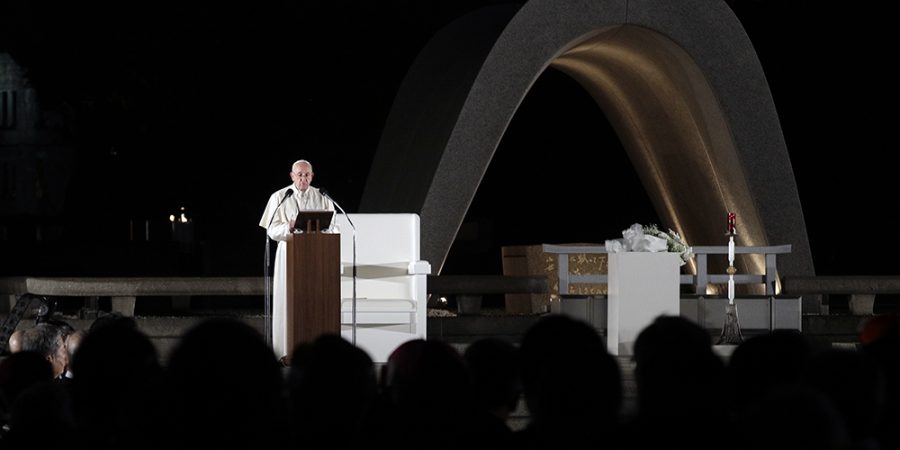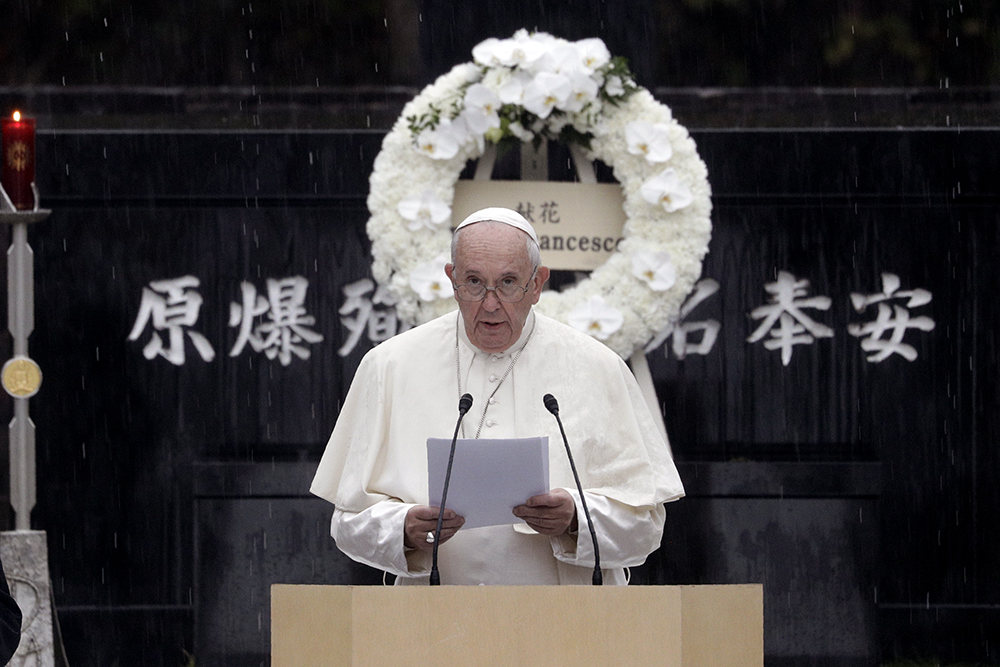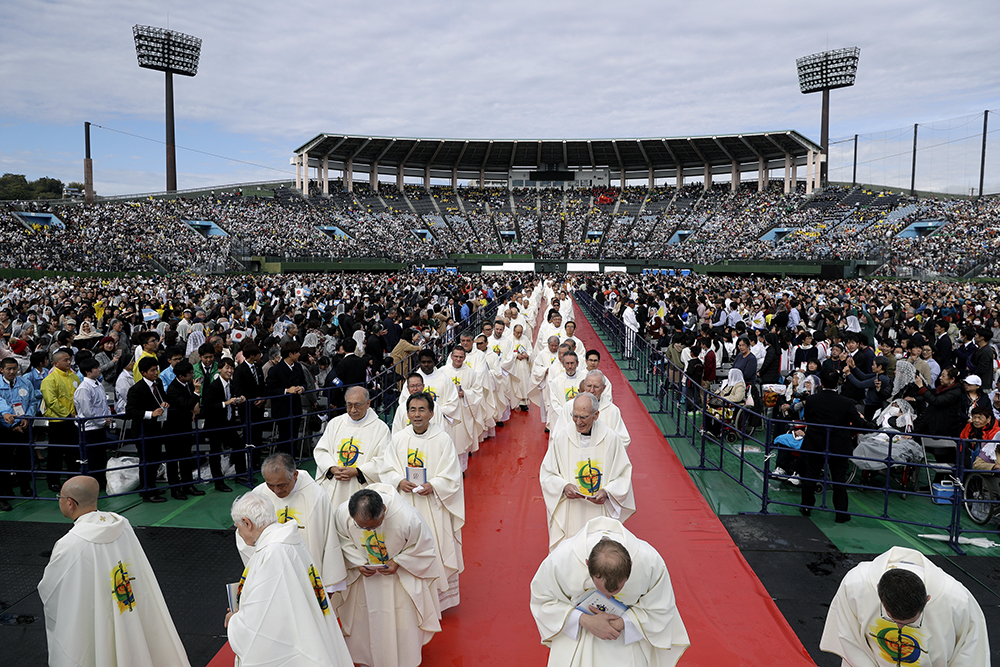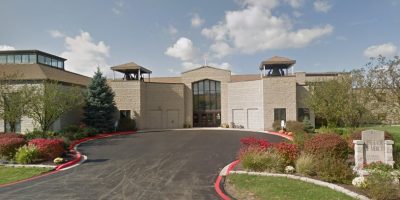The pope urged the global community to eliminate the threat of nuclear weapons...
In Japan, Pope Francis condemns nuclear weapons as immoral

“In a single plea to God and to all men and women of good will, on behalf of all the victims of nuclear weapons and experiments, and of all conflicts, let us together cry out: Never again war, never again the clash of arms, never again so much suffering!” the pope told the crowds gathered at the Hiroshima Peace Memorial (Nov. 24).
On Sunday (Nov. 24), Pope Francis visited Hiroshima and Nagasaki, two highly anticipated stops in his Nov. 23-26 apostolic visit to Japan after his stop in Thailand. The two cities were decimated by atomic bombs dropped by the United States August 9, 1945, forcing Japan to surrender and end the Second World War.
The United States remains the only nation to use nuclear weapons against another nation.
In the evocative setting of Hiroshima’s peace memorial, beneath the Genbaku Dome, the only building in the target zone to survive the explosion, Francis paid tribute not only to his predecessor Saint John Paul II, who delivered a speech against nuclear proliferation during his visit to Japan 38 years ago, but also to Pope Paul VI’s 1965 plea to end war with the phrase “Never Again!”
The Catholic Church in Japan has been a consistent voice in opposing the use of nuclear power over the years, and every year it promotes 10 days of activities, reflections and prayers for those who died and suffered as a result of the two atomic bombs.
Francis’ visit to the site of the disaster occurred in the late hours of the afternoon, amid an eerie silence among the nearly 30,000 gathered at the memorial. Francis embraced survivors, some of whom wept while remembering the devastating effects that the bomb had on their city and their lives.
In his speech, Francis said that “a true peace can only be an unarmed peace” and that the moral imperatives for the present and future generations are “to remember, to journey together, to protect.” World leaders especially, he said, must ensure to not lose the memory of past mistakes.

The pope urged the global community to eliminate the threat of nuclear weapons even as the world today “faces a climate of distrust,” where the interconnectedness promised by technology is trumped by “an erosion of multilateralism.”
Francis also remembered the suffering and martyrdom of the Catholic community in Japan, many of whom died in the bombing.
About 40,000 people overall, mostly civilians, died immediately from the blast. Many more perished from radiation exposure, with the death toll reaching almost 150,000 people in the months following.
Nagasaki’s Cathedral of the Immaculate Conception, the largest Catholic cathedral in Japan, also known as Urakami for the area of the city that surrounds it, was rebuilt in 1959. It is home to the head of a statue of the Virgin Mary that miraculously survived the atomic explosion.
In Nagasaki, a black marble slab commemorates the many victims of the atomic bomb, and more than 500 cherry trees line the Nagasaki nuclear memorial park. At the center stands a large statue of a man praying for the dead. His hand is aimed at the sky, to warn against the threat of nuclear weapons.
The city of Nagasaki has a long history of Catholicism. In the late 1500s, the city’s Catholic population grew thanks to an influx of Jesuit missionaries mostly from Spain and Portugal. Over time, the number of churches grew so much that Nagasaki earned the nickname “Little Rome.”
In 1587, worried about the growing foreign influence, Japan expelled all missionaries, and Catholics were forced to live their faith underground. For centuries afterward, Nagasaki remained a Christian hub where the faith was kept alive, but hidden, from the largely Buddhist and Shinto population.
The city is rich in martyrs who stood by their Catholic faith in the face of persecution. Among them is Saint Paul Miki, who, discovered to be a Catholic, was tortured and led to Nagasaki with 25 other young boys and men to be crucified and pierced with spears.
“Yes, here we see the darkness of death and martyrdom, but also the light of the resurrection, as the blood of the martyrs becomes the seed of the new life that Jesus wishes to bestow on us,” Francis said at the martyrs’ monument.

The pope later said Mass for 40,000 people of different backgrounds and beliefs at the Nagasaki baseball stadium. There he warned against the growing conflicts that divide the world today and continue to threaten the hope for peace.
“Nagasaki bears in its soul a wound difficult to heal, a scar born of the incomprehensible suffering endured by so many innocent victims of wars past and those of the present, when a third World War is being waged piecemeal,” Francis said.
Francis’ speech in Nagasaki called for further action and determination for nuclear disarmament by the global community of nations, suggesting that military spending could better benefit the poor and needy.
“Saint Paul VI suggested as much in 1964, when he proposed the establishment of a Global Fund to assist those most impoverished peoples, drawn partially from military expenditures,” Francis said, as heavy rains poured over Nagasaki’s Atomic Hypocenter Park.
After his day trip to the two Japanese cities, the pope returned to Tokyo, where he will spend the two remaining days of his visit. On Monday, he will visit the Japanese emperor and government officials, including Prime Minister Shinzo Abe, whose government has been hoping to invest in nuclear energy.
The Catholic Church, while always decrying the use of weapons of mass destruction, has so far not opposed the use of nuclear energy, despite the dangers to the environment.
But Francis, who has made the protection of the environment a staple of his pontificate, will call attention to the risks of nuclear power when he meets with victims of the 2011 Fukushima disaster, where a powerful earthquake and the subsequent tsunami damaged a nuclear power plant causing numerous casualties.
Read more Catholic news at XPian News… https://xpian.news/category/catholic/



Comments are Closed